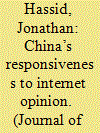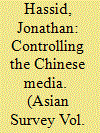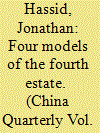|
|
|
Sort Order |
|
|
|
Items / Page
|
|
|
|
|
|
|
| Srl | Item |
| 1 |
ID:
139639


|
|
|
|
|
| Summary/Abstract |
Despite its authoritarian bent, the Chinese government quickly and actively moves to respond to public pressure over misdeeds revealed and discussed on the internet. Netizens have reacted with dismay to news about natural and man-made disasters, official corruption, abuse of the legal system and other prominent issues. Yet in spite of the sensitivity of such topics and the persistence of China’s censorship apparatus, Beijing usually acts to quickly address these problems rather than sweeping them under the rug. This paper discusses the implications of China’s responsiveness to online opinion. While the advantages of a responsive government are clear, there are also potential dangers lurking in Beijing’s quickness to be swayed by online mass opinion. First, online opinion makers are demographically skewed toward the relative “winners” in China’s economic reforms, a process that creates short-term stability but potentially ensures that in the long run the concerns of less fortunate citizens are ignored. And, second, the increasing power of internet commentary risks warping the slow, fitful – but genuine – progress that China has made in recent years toward reforming its political and legal systems.
|
|
|
|
|
|
|
|
|
|
|
|
|
|
|
|
| 2 |
ID:
082796


|
|
|
|
|
| Publication |
2008.
|
| Summary/Abstract |
Increasing economic liberalization of the Chinese media has not resulted in proportional political liberalization, and previous explanations for the state's puzzlingly firm grip are inadequate. This article argues that a "regime of uncertainty" is critical toward keeping the Chinese media in line
|
|
|
|
|
|
|
|
|
|
|
|
|
|
|
|
| 3 |
ID:
137072


|
|
|
|
|
| Summary/Abstract |
Based on a statistical analysis of 91 celebrity-endorsed charities in the People’s Republic of China, this paper challenges the popular assumption that celebrity involvement with not-for-profit organisations attracts extensive media coverage. Although China is the largest media market in the world, previous studies of celebrity philanthropy have been conducted almost exclusively in a Western context. Such studies argue passionately for and against the role that celebrities can play in attracting attention to humanitarian causes, focusing on the activities of Western celebrities, corporations and consumers as essential or problematic promoters and providers of aid to people in developing countries. We show that – in China, at least – most of this debate is overblown. Rather than arguing in favour of or against celebrity philanthropy, we provide statistical results suggesting that celebrity endorsement has very little impact on press coverage of charities.
|
|
|
|
|
|
|
|
|
|
|
|
|
|
|
|
| 4 |
ID:
114572


|
|
|
|
|
| Publication |
2011.
|
| Summary/Abstract |
Scholarly attention has not kept pace with the rapid changes in the professional role of Chinese journalists. Instead, two older views prevail. The first, which sees Chinese journalists as "mouthpieces" of the Communist Party unchanged from the Maoist era, downplays the tremendous changes in the media since 1978. The second view, holding that they are increasingly becoming "American-style professionals," overstates the influence of international media norms on Chinese news workers' day-to-day reality. While such communist and American-style professionals do exist in contemporary China, both are far less influential and numerous than stereotypes would suggest. Exclusive scholarly focus on these groups ignores two other more numerous and influential orientations: "advocate professionals," those who write to influence opinion and policy, and "workaday journalists," who work mainly for money and lack a commitment to public service. This article delineates all four types of Chinese journalist and explains why an understanding of the latter two professional orientations is critical to understanding China's media, politics and society.
|
|
|
|
|
|
|
|
|
|
|
|
|
|
|
|
|
|
|
|
|